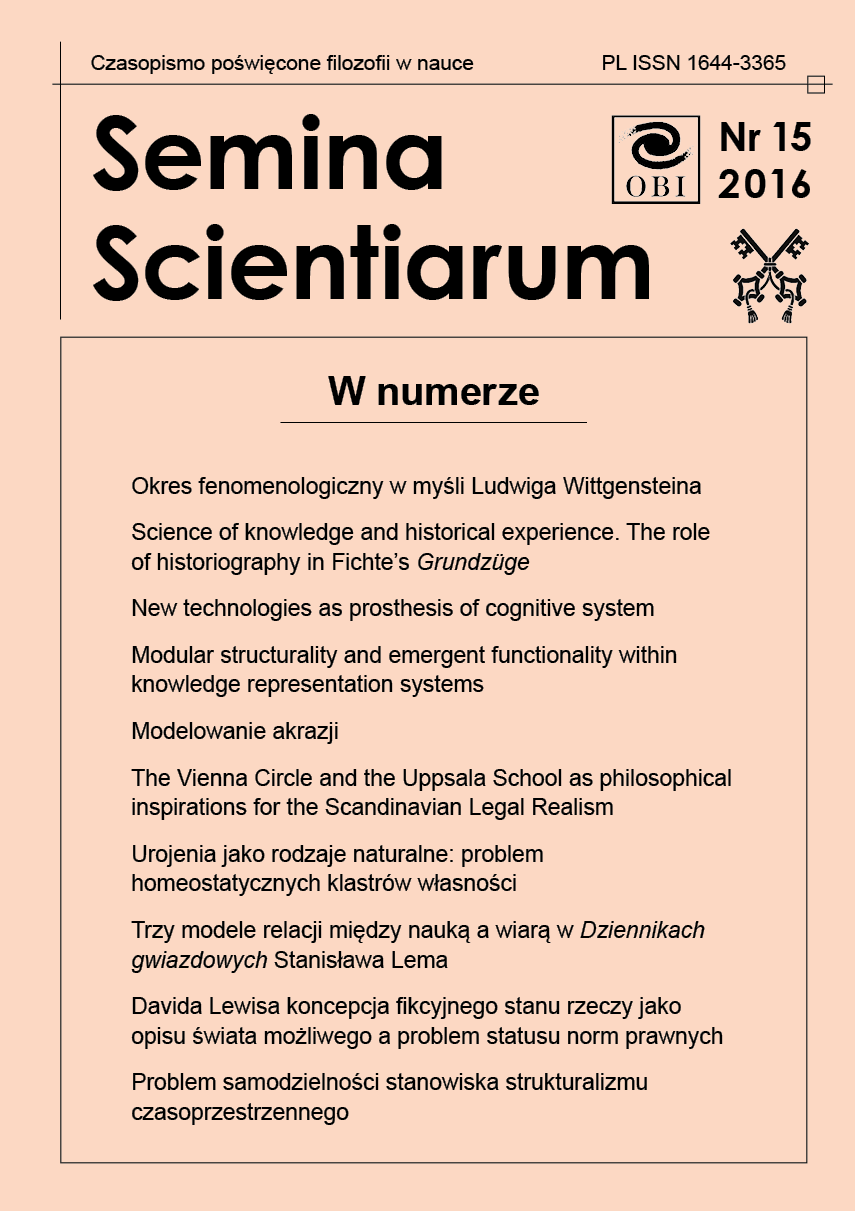Problem samodzielności stanowiska strukturalizmu czasoprzestrzennego
DOI:
https://doi.org/10.15633/ss.1775Słowa kluczowe:
structuralism, substantivalism, relationism, spacetime, General RelativityAbstrakt
The aim of this paper is to place the considerations provided by a philosophical family of positions called “spacetime structuralism” in the context of the debate between classical views: substantivalism and relationism in the philosophy of spacetime. Altough this task was somehow tackled in the past by other researchers, they never stated most generally, what exactly the problem with spacetime structuralism as a standpoint was. I view that problem as the problem of its autonomy and potential reducibility to both of the classical views. I modestly suggest a general viewpoint on spacetime structuralism: as a purely interpretative endeavour.Bibliografia
Bartels A., Modern essentialism and the problem of individuation of spacetime points, „Erkenntnis” (1996) 45, s. 25–46.
Callender C., Hugget N., Physics meets philosophy at the Planck scale. Contemporary theories in quantum gravity, Cambridge 2004.
Curiel E., On geometric objects, the non‑existence of a gravitational stress‑energy tensor, and the uniqueness of the Einstein field equation, http://philsci‑archive.pitt.edu/10985/1/nonexist‑grav‑seten‑uniq‑efe.pdf (19.04.2016).
DiSalle R., Understanding spacetime, Cambridge 2006.
Dorato M., Substantivalism, relationism, and structural spacetime realism, „Foundations of Physics” (2000) 30, s. 1605–1628.
Dorato M., Is structural spacetime realism relationism in disguise? The supererogatory nature of the substantivalism/relationism debate, [w:] The ontology of spacetime II, ed. D. Dieks, Amsterdam 2008, s. 17–38.
Earman J., World enough and space‑time: absolute versus relational theories of space and time, Cambridge 1989.
Earman J., Norton J. D., What price spacetime substantivalism, „British Journal for the Philosophy of Science” (1987) 38, s. 515–525.
Esfeld M., Lam V., Moderate structural realism about space‑time, „Synthese” (2008) 160, s. 27–46.
Greaves H., In search of (spacetime) structuralism, „Philosophical Perspectives” (2011) 25, s. 189–204.
Friedman M., Foundations of space‑time theories, Princeton 1983.
French S., Getting out of a hole: identity, individuality and structuralism in spacetime physics, „Philosophica” (2001) 67, s. 11–29.
Maudlin T., Buckets of water and waves of space: why space‑time is probably a substance, „Philosophy of Science” (1993) 60, s. 183–203.
Pooley O., Substantivalist and relationalist approaches to spacetime, http://philsci‑archive.pitt.edu/9055/ (18.04.2016).
Rovelli C., Halfwaythrough the woods, [w:] The cosmos of science, ed. J. Earman, J. Norton, Pittsburgh 1997, s. 180–223.
Rynasiewicz R., Absolute versus relational space‑time: an outmoded debate?, „The Journal of Philosophy” (1996) 93, s. 279–306.
Stachel J., The hole argument and some physical and philosophical implications, „Living Reviews in Relativity” 17 (2014) 1, s. 1–66, doi: 10.12942/lrr-2014-1.
Torretti R., Philosophy of geometry from Riemann to Poincare, Dordrecht 1978.
Wald R. M., General relativity, Chicago 1984.
Pobrania
Opublikowane
Numer
Dział
Licencja
Prawa autorskie (c) 2016 Damian Luty

Praca jest udostępniana na licencji Creative Commons Attribution-NonCommercial-NoDerivatives 3.0 Unported License.
Twórca oświadcza, że przysługują mu prawa autorskie do utworu i że nie są ograniczone w zakresie objętym niniejszym oświadczeniem oraz że utwór jest dziełem oryginalnym i nie narusza praw autorskich innych osób.
Twórca zezwala Uniwersytetowi Papieskiemu Jana Pawła II w Krakowie na nieodpłatne, niewyłączne i nieograniczone w czasie korzystanie z utworu, to jest:
- utrwalanie i zwielokrotnianie: wytwarzanie egzemplarzy utworu techniką drukarską, reprograficzną, zapisu magnetycznego oraz techniką cyfrową;
- obrotu oryginałem albo egzemplarzami, na których utwór utrwalono (wprowadzanie do obrotu, użyczenie lub najem oryginału albo egzemplarzy, publiczne wystawienie, wyświetlenie, a także publiczne udostępnianie utworu w taki sposób, aby każdy mógł mieć do niego dostęp w miejscu i w czasie przez siebie wybranym);
- włączenie utworu w skład utworu zbiorowego;
- udzielanie przez Uniwersytet Papieski Jana Pawła II w Krakowie sublicencji Creative Commons Uznanie autorstwa-Użycie niekomercyjne-Bez utworów zależnych 3.0 Polska
Uniwersytet Papieski Jana Pawła II w Krakowie udostępnia utwór na Platformie Czasopism należącej do uczelni, na licencji Creative Commons Uznanie autorstwa-Użycie niekomercyjne-Bez utworów zależnych 3.0 Polska. Tym samym uprawnia wszystkich zainteresowanych do korzystania z utworu pod następującymi warunkami:
- zostanie podany autor i tytuł utworu,
- zostanie podane miejsce publikacji (tytuł czasopisma i adres internetowy do oryginalnie opublikowanego utworu),
- utwór będzie dystrybuowany w sposób niekomercyjny,
- nie będą tworzone utwory zależne.

